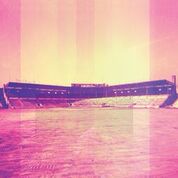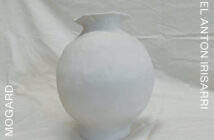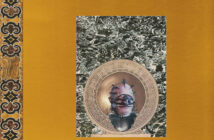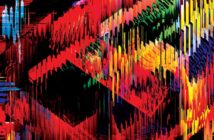Andrew Tuttle is a curious chap. In a good way – but let me just make that statement less of a naturalist’s butterfly pin. Mostly albums are required to have a certain conceit, an idea that frames the work and conveys some meaningful context to the listener. In an age of relentless experimentation, it would seem that this is almost an archaic idea, but nevertheless such activities still abound. Mostly because of the demands of the listener for meaning. Why the hell they just can’t go and make it for themselves, find it within themselves rather than in the work of others is sometimes beyond me. However Andrew’s idea is “The environment sets social interaction against total isolation. It sets self-reflexivity against self-confidence.” Immediately he has my hackles up and I want to damn him for his post-modernist tendencies and move on. But I think I will leave this festering bile in myself to concentrate on why the conceit is unnecessary. Essentially he is saying that these sort of electro-acoustic works demand a great deal of solitude and work by oneself and as such are a form of social fantasy, disconnected from the tribe of makers and listeners until the fantasy is conveyed.
Andrew Tuttle – Registration from ROOM40 on Vimeo.
Fantasy League, then can be dissected as a collection of Andrew’s proficiencies: Banjo, Acoustic Guitar, Synthesiser and Computer. The introduction track, ‘Registration’ starts with a amped up bright drone and overlays an almost Appalachian banjo track, which has a hesitant confidence in contrast to the control demonstrated in the tonal control. It is as close to an electronic ideal as you can one might expect. ‘Activation’ moves into a cascade of synth tones at a fast pace, the sound of a smoke machine release and then the low and play of the cascade at a relentless high tone register that eventually brings in synth mimicking bird calls. It is an ambient assault if that makes any sense with the electro-acoustic musician’s savage wielding of full spectrum dominance.
‘Teambuilding’, the third track, while a concept much mocked by artistic types essentially happens even in artistic circles. Tuttle is a relentless worker for the cause of Lawrence English’s Room 40 label, electronic music in Brisbane and now in the wider global context. This short track meanders through an electronic miasma but somehow is disconnected from eliciting anything much here. Back to bringing the banjo back into focus with ‘Forgotten Username?’. There is much to admire in the specific use of this instrument on Tuttle’s behalf. It is not necessarily an easy instrument to master and it is culturally specific nowdays and elicits images of specific communities and thus melded with his quite masterful use of electronics, specifically of the mixing and control it presents a bravado that is other than the machismo often seen in electronic music. ‘Forgotten Username’ does the same for the acoustic guitar. It goes through certain constructed chords and melodies and repeats these while the electronic frame builds around it.
‘Public League’ and ‘Private League’ are more in the territory of ambient acoustic works, the former a bright twinkle with minimalist reprise and building layers of synth tonal waves. The latter almost akin to an organist’s electronic tonal breakdown with stretched and thrown tones spinning off with a subtle aplomb. It has all the acid touches of 90’s ambient chill out but with dastardly clarity and precision. ‘Leaderboard’ again throws a tone assault of crafted waves of sonic forms fleeting through and being melded and replaced with quickening fluidity. ‘Injury crisis’ brings back the banjo and a swirling disturbed electronic background, it conveys a sense of psychological malaise before it slips from sight and a clarity arises allowing for the sounds of the banjo to be thrown in a bub landscape around a flexible sonic canvas. ‘Maximum changes reached’ is back at electronic drone artist imitating organist territory. There is a lot of exciting organist action happening in the music world, and that electronic musicians want to reach for this space which is reserved in western contexts for liturgical work is no surprise as it has a much different cultural hook than Tuttle’s use of the banjo. ‘Account locked’ finishes the album and it is in the mode of electronic cascades that Tuttle is so fond of; cycling from brightness to brightness and with a rapidity that astounds the ear and forces alertness. It is not an easy exit, and while it holds some of the aspects of ambient music it is generally aiming at display of technical skill and control of sonic palette.
Fantasy League is an interesting and challenging album to the ear. I am sure the technical discussion that musicians would have with each other about the content, construction and achievement of this album is quite different than what I have conveyed. However it is clear that Tuttle’s technical prowess is greater than his ability to make connections with a generalist audience. In this manner the idea of it is a ‘Fantasy League’ where the outer regions of the endeavour are forever shielded from the conveyance of the sound. What could one say reflexively, or even self-reflexively, the outer regions is all there is to aim for and to send ones messages back home to satiate the home team.
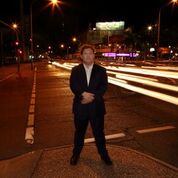
Andrew Tuttle’s ‘Fantasy League’ is available through Room 40

